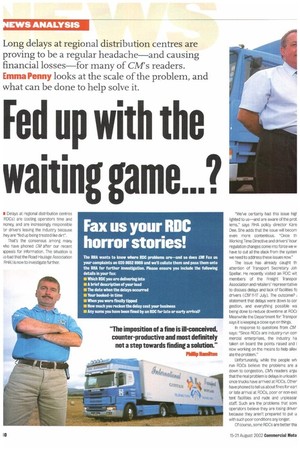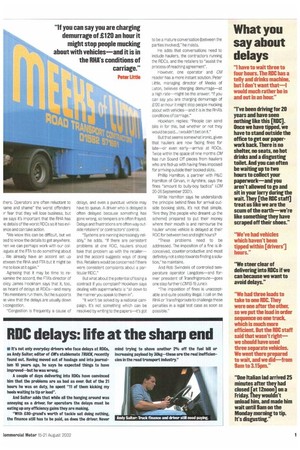Fed up with the waiting game....
Page 10

Page 11

If you've noticed an error in this article please click here to report it so we can fix it.
Delays at regional distribution centres RDCs) are costing operators time and noney, and are increasingly responsible or drivers leaving the industry because hey are "fed up being treated like dirt".
That's the consensus among many fvho have phoned CM after our recent ippeals for information. The situation Is o bad that the Road Haulage Association RHA) is now to investigate further.
"We've certainly had this issue high lighted to us—and are aware of the prot lems," says RI-IA policy director Kare Dee. She adds that the issue will broom even more contentious. 'Once th Working Time Directive and drivers' hour regulation changes come into force we w have to cut all the slack from the systemr we need to address these issues now."
The issue has already caught th attention of Transport Secretary Joh Spellar. He recently visited an ADC wit members of the Freight Transpor Association and retailers' representative to discuss delays and lack of facilities to drivers (CM 11-17 July). The outcomeP statement that delays were down to cor gestion, and everything possible we being done to reduce downtime at ADD Meanwhile the Department for Transpor says it is keeping a close eye on things.
In response to questions from CM says: "Since RDCs are industry-run our merciai enterprises, the industry ha taken on board the points raised and i now working on the means to help alley ate the problem."
Unfortunately, while the people wh run ADCs believe the problems are a down to congestion, CMs readers argu that the real problem is delays in unloadin once trucks have arrived at RDCs. Other have phoned to tell us about fines for earl or late arrival at RDCs, poor or non-exit tent facilities and rude and unpleasar staff. Such are the problems that som operators believe they are losing driver because they aren't prepared to put with such poor conditions any longer.
Of course, some RDCs are better tha thers. Operators are often reluctant to lame and shame" the worst offenders fear that they will lose business, but ee says it's important that the RHA has detalls of the worst RDCs so it has evience and can take action.
"We know this can be difficult, but we eed to know the details to get anywhere. her we can perhaps work with our colagues at the FTA to do something about . We already have an accord set up etween the RHA and FTA but it might be me to look at it again."
Agreeing that it may be time to rexamine the accord, the RA's director of olicy James Hookham says that it, too, as heard of delays at RDCs—and many fits members run them. But he supports le view that the delays are usually down lcongestion.
"Congestion is frequently a cause of delays, and even a punctual vehicle may have to queue. A driver who is delayed is often delayed because something has gone wrong, so tempers are often frayed. Delays and frustrations are often way outside retailers' orcontractors' control.
"Systems are running increasingly reliably" he adds. "If there are persistent problems at one RDO, hauliers should take that problem up with the retailer— and the accord suggests ways of doing this. Retailers would be concerned if there were consistent complaints about a particular ADC."
But what about the potential of losing a contract if you complain? Hookham says dealing with supermarkets is 'all down to the manner you speak to them in".
"It won't be solved by a national campaign. It's not something which can be resolved by writing to the papers—it's got to be a mature conversation [between the parties involved]," he insists.
He adds that conversations need to include hauliers, the contractors running the RDCs, and the retailers to "assist the process of reaching agreement".
However, one operator and CM reader has a more instant solution. Peter Little, managing director of Meeks of Luton, believes charging demurrage—at a high rate---might be the answer. "If you can say you are charging demurrage of £120 an hour it might stop people mucking about with vehicles—and it is in the RHA's conditions of carriage."
Hookham replies: "People can send bills in for this, but whether or not they would be paid... I wouldn't bet on it."
But that seems somewhat ironic, given that hauliers are now facing fines for late or even early—arrival at RDCs. Twice within the space of nine months CM has run Sound Off pieces from hauliers who are fed-up with having fines imposed for arriving outside their booked slots.
Phillip Hamilton, a partner with P&C Hamilton of Girvan, in Ayrshire, says the fines "amount to bully-boy tactics" (CM 20-26 September 2001), While Hamilton says he understands the principle behind fines for arrival outside booking slots, it's not that simple. "Are they [the people who dreamt up the scheme] prepared to put their money where their mouth is and reimburse the haulier whose vehicle is delayed at their ROC for between two and eight hours?
"These problems need to be addressed. The imposition of a fine is illconceived, counter-productive and most definitely not a step towards fading a solution," he maintains.
And Rob Swindells of controlled temperature operator Langdons—and former president of Transfrigerose—goes one step further (CM13-19 June): "The imposition of fines is unacceptable and quite possibly illegal. I call on the RHA or Transfrigoroute to challenge these penalties in a legal test case as soon as possible."
















































































































































